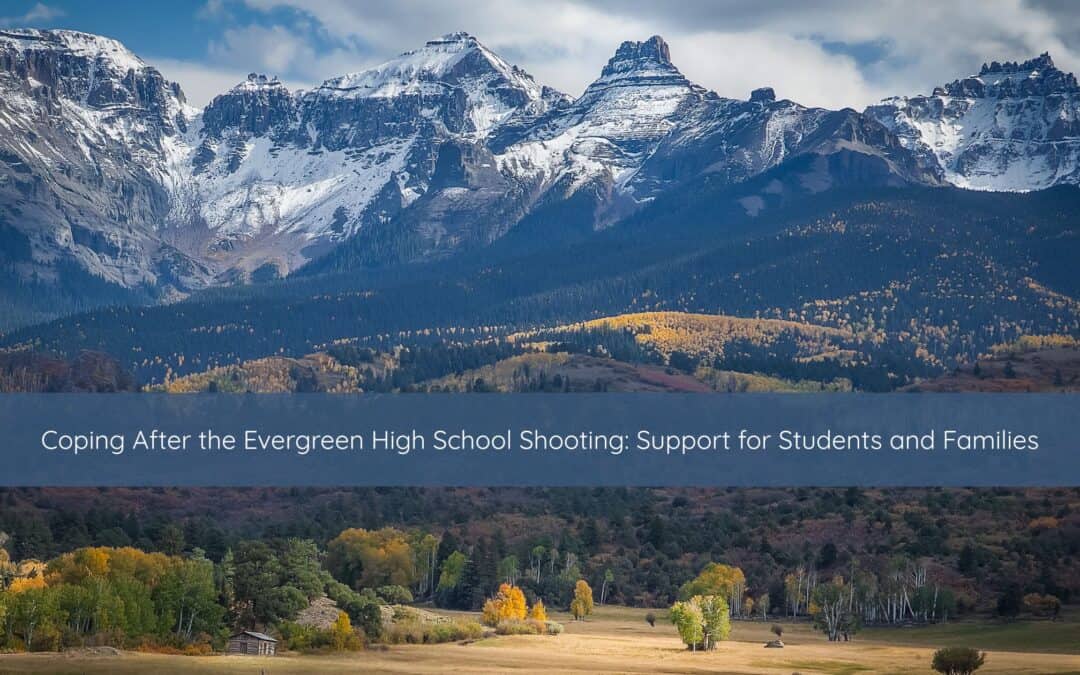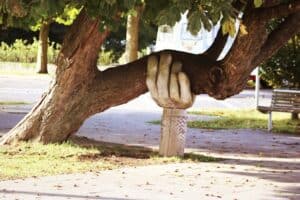Since the beginning of the school year, communities across the United States have been shaken by multiple school shootings — including the tragic event this week at Evergreen High School and, earlier this school year, a shooting at Annunciation Catholic School in South Minneapolis during a morning Mass. My family and I live in Evergreen, and while I have always felt compassion and deep sadness for the other communities affected by such violence, it felt far away. And then this week it happened here in the town I call home.
In Colorado, we are no stranger to school shootings, yet that doesn’t make them any easier to understand or endure. Each one brings fresh pain and grief, even when we’ve been through similar tragedies before. For students, parents, and families here, the fear and grief are immediate reminders that school — a place that should feel safe — can suddenly become a site of fear, trauma, and loss. This blog is meant to offer Evergreen High School shooting support, as well as general guidance for coping after a school shooting.
If you are a student, a parent, or part of a family impacted by these events, please know this: the way you are feeling right now is valid and you are not alone. Fear, sadness, anger, confusion, numbness, really any kind of emotion— all of these are natural responses to something no one should ever have to live through. In time, with support and care, hope and healing are possible. They may come slowly and unevenly, but they do come, often in the small moments of connection and safety that remind us we are not alone in this.
For Students
 Your world may feel upside down right now. It’s common to:
Your world may feel upside down right now. It’s common to:
- Feel jumpy or unsafe, even in familiar spaces.
- Have trouble concentrating on schoolwork.
- Replay what happened or avoid anything that reminds you of it.
- Swing between big emotions — sadness, anger, relief, numbness.
None of this takes away from your strength. It means your body and mind are working hard to process something overwhelming.
What can help right now:
- Walk and talk. After 9/11, researchers noticed that New Yorkers who walked home together and talked through their experience had lower rates of long-term PTSD than survivors of other disasters who were stranded in isolation. Walking with a trusted friend or family member and telling your story — even more than once — can help your brain and body begin to process what happened. This is one of the simplest yet most effective tools for coping after a school shooting.
- Take breaks from the news and social media. Too much exposure can keep your nervous system on high alert.
- Stay connected. Even if being at school feels hard, find safe ways to spend time with people who help you feel grounded, and who listen without reaching for painful clichés, like saying ‘you’re lucky it wasn’t worse’ or ‘that time heals all wounds’. Those phrases are often meant kindly, but they rarely bring comfort in the moment.
- Remember that healing takes time. You don’t need to “bounce back” quickly. It’s okay to take it one day at a time.
For Parents and Families
Supporting your child after a school shooting is overwhelming. You may be managing your own fear while trying to reassure your child.
- Validate their feelings. Let them know it’s normal to feel scared, angry, or shut down.
- Listen more than you fix. Sometimes just saying, “I’m here with you. I’m so sorry this happened” means more than any advice.
- Stick to routines when possible. Predictability helps kids feel safe.
- Check in on basics. Eating, sleeping, moving, and connecting are essential but often disrupted after trauma.
- Seek help when needed. If your child has ongoing nightmares, panic, withdrawal, or feels like they’re reliving the event, reach out for professional support. Parents and community members may also need their own support so that they can be steady resources for children. Trauma therapies like EMDR can be especially helpful in processing community‑wide tragedies and reducing the lingering impact of traumatic stress. These kinds of therapies are important for trauma recovery in Evergreen and for families everywhere affected by violence.
Resources for Families After School Shootings
- National Child Traumatic Stress Network (NCTSN): Parent Guidelines for Helping Youth After the Recent Shooting and School Shooting Resources
- SAMHSA School Shooting Resources: Tip sheets and tools for parents, schools, and communities – samhsa.gov
- Safe and Sound Schools: Toolkits, training, and recovery resources for parents and schools – safeandsoundschools.org
- Everytown Survivor Network: Support and connection for survivors of gun violence – everytownsupportfund.org
- Sandy Hook Promise: Guidance for helping children cope with gun violence tragedies – sandyhookpromise.org
- The Rebels Project: Peer support created by Columbine survivors for survivors of mass shootings – therebelsproject.org
- Colorado Crisis Hotline: Call 1-800-493-8255 or Text “TALK” to 38255
- National Parent Helpline: Call 1-855-427-2736 for emotional support and resources for parents and caregivers
Final Thoughts
If you are a student or parent in Evergreen, Minnesota, or anywhere touched by school shootings, please know you are not alone. Healing will take time, and it will look different for each of you. What matters most is taking small steps, leaning on safe people, and remembering that your body and mind can recover from even the most painful events.
You are part of a community that cares deeply for you and will walk beside you.
“Alone we can do so little; together we can do so much.” – Helen Keller
The path forward will not be simple, but small steps, safe connections, and community care help make healing possible. If you need a safe place to talk or guidance on how to cope, reach out anytime.


